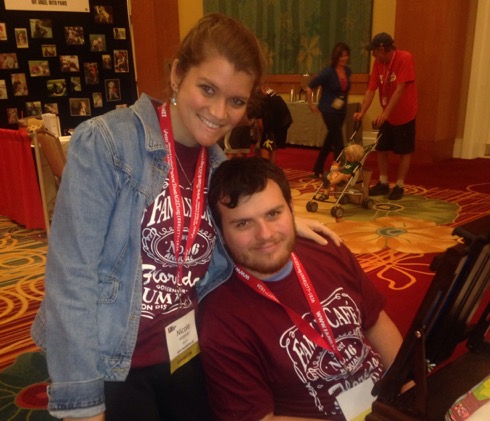Having a twin brother with autism has inspired me to study Family and Child Sciences at Florida State University and pursue a career in Disability Services/Education. I am specifically interested in a focus on the individual’s life after high school and how he or she can experience successful and positive outcomes.
Over recent years, I have watched my parents discover new options for my brother that they wish they had known about in the past. Having a child with a disability doesn’t come with an instruction manual, so I am writing this letter to parents in hopes that they will be able to relate and understand that there are opportunities available for their children.
To the Concerned Parent of a Child with a Disability:
Having a child with a disability can provoke so many thoughts and questions. Having fear or worry about who your child’s therapist or pediatrician will be, all the way to what your child’s living arrangements will be years down the road, are definitely some of the common concerns among parents. There is never any way of knowing what the future holds for your child, but there are a few smart ways to be prepared.
1. Put away whatever cash you can for a “rainy day.”
Even if it’s only five or 10 dollars a week, that savings will go a long way. For example, your child may need a change in medication or a new wheelchair as he or she gets older. Your child might be interested in college after high school. Changes can be very costly, so it’s important to keep all of the possibilities in mind.
2. Join support groups and attend disability-related conferences and workshops.
Hearing the experiences of other families and discovering resources that you didn’t know were out there can change your child’s life. For example, there are unique classroom learning options in public and private schools that can benefit your child’s education (such as the McKay Scholarship Program and Individual Education Plans).
Being knowledgable about your child’s disability and learning how to manage it in the best way possible is not only in the best interest of your child, but of your entire family as well.
3. Physically map out the future (think diagrams and lists).
Even if your child is an infant, it’s never too early! Draw out a diagram or make a list if you have to. Think about the goals that you’d like to reach together and at what point you’d like to tackle them. If you have a daughter, for example, consider how you will help with her menstruation cycle when she becomes a pre-teen. Take note of the traits that you’d like your child’s future trustworthy respite care worker to have. Research employment options for after your son or daughter graduates.
4. Plan for future care.
Does your child have a sibling or other family member that can step up and take the responsibility of caring for him or her a long way down the road? Is the group home a viable option for your child’s future housing situation?
If all of these decisions seem overwhelming to you, always remember that you are not alone. Your child is beautiful in every way and appreciates your every move. Even if your child has a difficult way of showing it, he or she is so fortunate to have such a loving parent like yourself. I am currently the legal back-up guardian to my twin brother with autism and all of these factors are constantly on my mind.
My parents have gone above and beyond to make sure that my brother, Dan, has received the proper services and been given opportunities for success, equally to his typical peers. He is now a caricature artist at fundraiser events and conferences. Just remember that it’s never too early to get a head start for future plans.
The Mighty is asking the following: Can you describe the moment someone changed the way you think about a disability or disease? If you’d like to participate, please send a blog post to community@themighty.com. Please include a photo for the piece, a photo of yourself and 1-2 sentence bio.
Want to end the stigma around disability? Like us on Facebook.
And sign up for what we hope will be your favorite thing to read at night.

